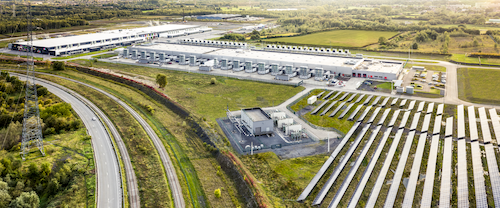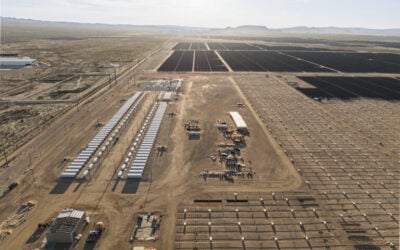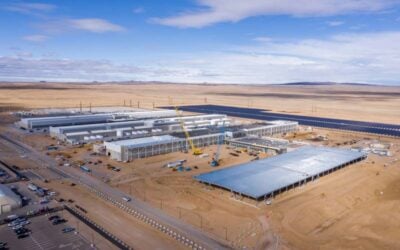
Carbon-free energy power purchase agreements (PPAs) signed by Google and a California community energy group could be a widely replicable model for other supply deals, Energy-Storage.news has heard.
California community choice aggregator (CCA) electricity supplier Silicon Valley Clean Energy (SVCE) announced last week that it has signed PPAs with the technology giant that matches Google’s local energy demand 24/7 with clean energy production.
Enjoy 12 months of exclusive analysis
- Regular insight and analysis of the industry’s biggest developments
- In-depth interviews with the industry’s leading figures
- Annual digital subscription to the PV Tech Power journal
- Discounts on Solar Media’s portfolio of events, in-person and virtual
Google is targeting carbon emissions-free running of its operations by 2030 and, like SCVE is headquartered in California, which has a state policy goal of 100% carbon-free electricity by 2045.
SCVE meanwhile is a community-owned energy agency which provides energy to members in six California jurisdictions. The 10-year deal will see SVCE serving the load of Google’s Mountain View and Sunnyvale offices to match demand with carbon-free energy for at least 92% of hours a year.
SCVE told Energy-Storage.news the agreement includes supply from multiple power purchase agreements (PPAs).
Energy storage is a vital component of the deal and the resource mix involved, Don Bray, director of energy services and community relations for SVCE, told Energy-Storage.news.
“While SVCE and Google transition to a dedicated set of resources, Google’s load will be met with wind, solar-plus-storage, geothermal and other carbon-free resources,” Bray said, with this evolving over time.
“Ultimately, Google’s load will be met with 24×7 carbon-free resources comprised of wind, solar-plus-storage, geothermal and standalone storage resources.”
The office buildings have been designed with a high level of electrification of their infrastructure in place already and Google itself has behind-the-meter solar and storage and other distributed energy resources (DERs), which will also be optimised to meet its carbon-free energy (CFE) needs, according to Bray.
“[Energy] storage, both front-of-the-meter and behind-the-meter will play an instrumental role in meeting Google’s CFE targets,” Bray said, adding that SVCE and Google together “intend to deploy [renewables] paired and standalone storage of varying discharge durations”.
SVCE believes this is a deal that can be replicated not only across Google’s other facilities but could be used by the energy supplier to create retail electricity offerings of a similar nature for other commercial customers.
It hinges on Google’s 24/7 CFE methodology, which the tech company published in February 2021, following the 2020 announcement of its carbon-free target. While the company already achieved net zero carbon in 2007 and by 2017 had matched 100% of its consumption with renewable energy purchases, it now aims to operate solely on CFE at its data centres and campuses all-year round.
“This agreement with SVCE allows us to both decarbonise our energy supply at Google, while also giving SVCE the opportunity to test innovative strategies to decarbonise all their customers,” Google head of energy and carbon Asim Tahir said.
“The SVCE 24/7 carbon-free energy service with Google serves as a model for how large commercial energy customers and energy providers can work together to further advance clean, carbon-free electricity on the grid, coupled with electrification efforts in the local community. This type of forward-thinking collaboration is a real difference-maker in our full-scale transition from fossil fuels to clean electricity,” SVCE’s CEO, Girish Balachandran said.
Google’s interest in energy storage extends to long-duration
Related developments for Google include a deal for round-the-clock clean energy to power its data centre operations in Virginia from a US$600 million, 500MW portfolio of wind, solar, hydro and battery storage.
That deal, struck with power and renewables company AES Corporation would make its facilities in the southeastern US state run on carbon-free power 90% of the time, from a mix of AES-owned and third-party assets, AES said at the time.
In September that year, sister site PV Tech reported that Google had signed a three-year, 140MW agreement with European utility company Engie, for energy from a portfolio of storage-backed wind and solar in Germany, which likewise fell under the 24/7 CFE remit.
Also in Europe, energy storage system (ESS) provider Fluence – which is part-owned by AES – supplied battery storage at a Google data centre in Belgium. The trial deployment, which enables the data centre to eliminate reliance on diesel backup generators, could likewise be a model for replication elsewhere, according to Google.
Incidentally, Silicon Valley Clean Energy might be a familiar name to regular readers of this site. As well as being among California’s CCAs which are signing contracts for energy from clean energy resources, particularly solar-plus-storage, at a significant scale, SVCE is also among a group of CCAs that have signed contracts for large-scale, long-duration energy storage (LDES) resources.
Two lithium-ion battery storage projects, each with a duration of eight hours, will be built to help the CCAs meet procurement goals for LDES mandated by the California Energy Commission (CEC), designed to help the state ensure reliable electricity supply and to come online for the 2025-2026 timeframe.
SVCE’s Don Bray said the agreement with Google is for resources that will be built with the search engine company’s CFE requirements in mind.
“As such, contracts signed through CC Power [the group to which SVCE belongs] for long-duration storage will not be used to meet Googles 24×7 goals,” Bray said.
However, SVCE and Google will, Bray said, “determine how or when to best incorporate long-duration storage over the next five to 10 years,” into the agreement.
Earlier this year, Google, along with Microsoft and other major corporates, became members of the global Long Duration Energy Storage Council (LDES Council).






